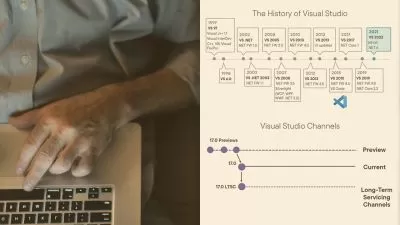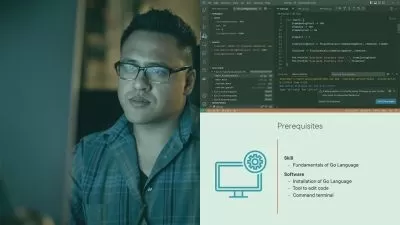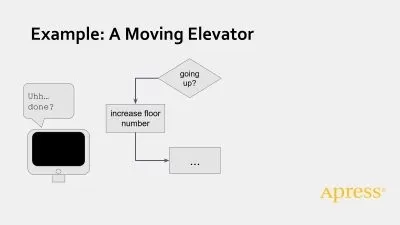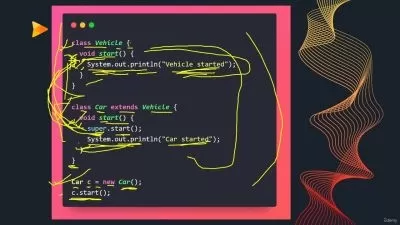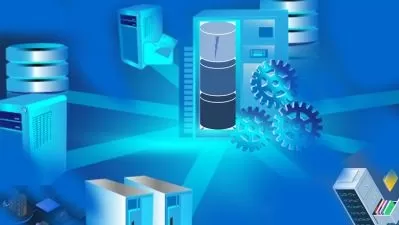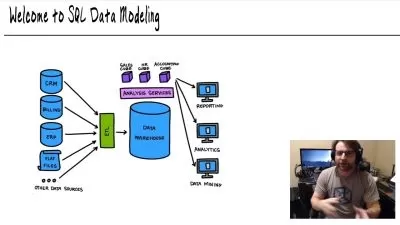THE PROGRAMMERS BRAIN
Focused View
9:34:29
14 View
00001 Part 1 On reading code better.mp4
00:37
00002 Chapter 1 Decoding your confusion while coding.mp4
07:39
00003 Chapter 1 Different cognitive processes that affect coding.mp4
09:15
00004 Chapter 1 Cognitive processes in collaboration.mp4
05:39
00005 Chapter 2 Speed reading for code.mp4
12:49
00006 Chapter 2 Overcoming size limits in your memory.mp4
12:01
00007 Chapter 2 You see more code than you can read.mp4
06:50
00008 Chapter 2 It s not what you remember it s the way you remember it Part 1.mp4
09:07
00009 Chapter 2 It s not what you remember it s the way you remember it Part 2.mp4
07:18
00010 Chapter 2 Practice chunking.mp4
05:46
00011 Chapter 3 How to learn programming syntax quickly.mp4
06:22
00012 Chapter 3 How to learn syntax quickly with flashcards.mp4
06:54
00013 Chapter 3 Why do we forget memories.mp4
07:58
00014 Chapter 3 How to remember syntax longer.mp4
08:18
00015 Chapter 3 Strengthen memories by actively thinking.mp4
09:57
00016 Chapter 4 How to read complex code.mp4
10:18
00017 Chapter 4 Techniques to reduce cognitive load.mp4
05:00
00018 Chapter 4 Replacing unfamiliar language constructs.mp4
08:06
00019 Chapter 4 Memory aids to use when your working memory is overloaded.mp4
05:23
00020 Chapter 4 Using a state table.mp4
07:41
00021 Part 2 On thinking about code.mp4
00:37
00022 Chapter 5 Reaching a deeper understanding of code.mp4
07:10
00023 Chapter 5 Eleven roles to cover almost all variables.mp4
06:23
00024 Chapter 5 Roles and paradigms.mp4
05:38
00025 Chapter 5 Hungarian notation.mp4
06:10
00026 Chapter 5 Gaining a deeper knowledge of programs.mp4
05:53
00027 Chapter 5 Different stages of program understanding.mp4
07:12
00028 Chapter 5 Reading text is similar to reading code.mp4
07:48
00029 Chapter 5 If you can learn French you can learn Python.mp4
10:30
00030 Chapter 5 Text comprehension strategies applied to code.mp4
08:12
00031 Chapter 5 Inferring the meaning of variable names.mp4
09:36
00032 Chapter 6 Getting better at solving programming problems.mp4
09:43
00033 Chapter 6 Mental models.mp4
07:43
00034 Chapter 6 How to use mental models efficiently when thinking about code Part 1.mp4
08:54
00035 Chapter 6 How to use mental models efficiently when thinking about code Part 2.mp4
07:07
00036 Chapter 6 Notional machines.mp4
10:12
00037 Chapter 6 Notional machines and language.mp4
11:55
00038 Chapter 7 Misconceptions - Bugs in thinking.mp4
11:09
00039 Chapter 7 Different forms of transfer.mp4
10:22
00040 Chapter 7 Misconceptions - Bugs in thinking.mp4
10:41
00041 Chapter 7 Misconceptions about programming languages.mp4
11:12
00042 Part 3 On writing better code.mp4
00:34
00043 Chapter 8 How to get better at naming things.mp4
07:31
00044 Chapter 8 Different perspectives on naming.mp4
08:55
00045 Chapter 8 Cognitive aspects of naming.mp4
09:58
00046 Chapter 8 What types of names are easier to understand.mp4
08:55
00047 Chapter 8 Snake case or camel case.mp4
08:14
00048 Chapter 8 Name molds.mp4
10:55
00049 Chapter 9 Avoiding bad code and cognitive load - Two frameworks.mp4
10:06
00050 Chapter 9 How code smells harm cognition.mp4
05:45
00051 Chapter 9 The influence of bad names on cognitive load.mp4
09:24
00052 Chapter 9 Measuring cognitive load.mp4
10:02
00053 Chapter 10 Getting better at solving complex problems.mp4
10:17
00054 Chapter 10 How to teach your LTM to solve problems.mp4
08:09
00055 Chapter 10 Automatization - Creating implicit memories.mp4
07:49
00056 Chapter 10 Why automatization will make you program quicker.mp4
09:55
00057 Chapter 10 A new type of cognitive load - Germane load.mp4
08:12
00058 Part 4 On collaborating on code.mp4
00:33
00059 Chapter 11 The act of writing code.mp4
06:17
00060 Chapter 11 Transcription.mp4
05:14
00061 Chapter 11 Programmer interrupted.mp4
06:16
00062 Chapter 11 How to better prepare for interruptions.mp4
07:47
00063 Chapter 11 When to interrupt a programmer.mp4
05:58
00064 Chapter 11 Some thoughts on multitasking.mp4
05:16
00065 Chapter 12 Designing and improving larger systems.mp4
09:44
00066 Chapter 12 Cognitive dimensions Part 1.mp4
12:28
00067 Chapter 12 Cognitive dimensions Part 2.mp4
10:24
00068 Chapter 12 Dimensions and activities.mp4
05:41
00069 Chapter 13 How to onboard new developers.mp4
05:16
00070 Chapter 13 Differences between experts and novices.mp4
09:51
00071 Chapter 13 Beginners behavior in more depth.mp4
05:33
00072 Chapter 13 Activities for a better onboarding process.mp4
09:31
00073 Chapter 13 Read code together.mp4
06:54
More details
User Reviews
Rating
average 0
Focused display

Manning Publications
View courses Manning PublicationsManning Publications is an American publisher specializing in content relating to computers. Manning mainly publishes textbooks but also release videos and projects for professionals within the computing world.
- language english
- Training sessions 73
- duration 9:34:29
- Release Date 2023/11/06







